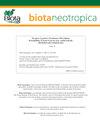民族生态学研究对保护和可持续利用生物多样性的重要性:对FAPESP六十年支持的批判性分析
IF 1.2
4区 环境科学与生态学
Q3 BIODIVERSITY CONSERVATION
引用次数: 1
摘要
摘要:本文旨在评估本文章由计算机程序翻译,如有差异,请以英文原文为准。
The importance of ethnoecological studies for the conservation and sustainable use of biodiversity: a critical analysis of six decades of support by FAPESP
Abstract This paper aims to assess the area of ethnoecology within funding provided by the São Paulo Research Foundation (FAPESP) to projects and events in order to discuss the importance of this area for the conservation and sustainable use of biodiversity and the opportunity to advance this area of knowledge, The paper presents a retrospective analysis of the 75 projects and 21 events organized in the area of ethnoecology that received support from FAPESP in the last 60 years. For this purpose, a search was performed in the FAPESP databases using the keywords Ethnoecology, Ethnobiology, Ethnoscience, Ethnoichthyology, Ethnotaxonomy, Ecological Anthropology, Ethnobotany, Ethnozoology, Ethnopharmacology, Traditional Knowledge, Traditional Ecological Knowledge, Indigenous Knowledge, Ethnography, Human Ecology and Ethnoarcheology. Research Support modality accounted for most of the projects (88%), with 45.3% of funding occurring in the decade of 2000–2009. No project was supported in the first two decades and only eight were part of the BIOTA Program. The main areas of submission were Biological Sciences (46.7% of projects and 47.6% of events) and Humanities (38.7% of projects). The research questions and methods of the projects developed over the last four decades were analyzed critically and comparatively. Given the data collected, an increase of ethnocecological projects supported by the BIOTA Program and through the thematic modality may contribute to advance this area of knowledge and to cross the path from inter to transdisciplinar science.
求助全文
通过发布文献求助,成功后即可免费获取论文全文。
去求助
来源期刊

Biota Neotropica
BIODIVERSITY CONSERVATION-
CiteScore
2.90
自引率
16.70%
发文量
0
审稿时长
4-8 weeks
期刊介绍:
BIOTA NEOTROPICA is an electronic, peer-reviewed journal edited by the Program BIOTA/FAPESP: The Virtual Institute of Biodiversity. This journal"s aim is to disseminate the results of original research work, associated or not to the program, concerned with characterization, conservation and sustainable use of biodiversity within the Neotropical region.
Manuscripts are considered on the understanding that their content has not appeared, or will not be submitted, elsewhere in substantially the same form, because once published their copyrights are transferred to BIOTA NEOTROPICA as established in the Copyright Transfer Agreement signed by the author(s).
 求助内容:
求助内容: 应助结果提醒方式:
应助结果提醒方式:


